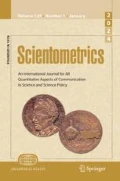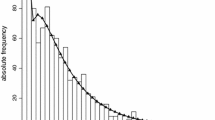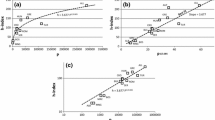Abstract
Empirical research carried out on a representative sample of 921 scientists from Croatia has shown that scientific fields are important socio-cognitive productivity framework. First, this can be seen in significantly different patterns of the average scientific productivity of researchers in different fields. Second, significant are the differences in the social organization of scientific fields, especially in the fragmentation and organization of the research process, which manifest themselves with a different engagement intensity of the respondents in each stage of the project. Finally, scientific productivity predictors are structured, ranging from significant ones in some fields, to those significant everywhere (qualifications and project roles).
Similar content being viewed by others
References and notes
B. F. Reskin, Sex Differences in Status Attainment in Science. The Case of Postdoctoral Fellowship,American Sociological Review, 41 (1976) No. 4, 597–612.
B. F. Reskin, Scientific Productivity and the Reward System of Science,American Sociological Review, 42 (1977) No. 3, 491–504.
B. F. Reskin, Scientific Productivity, Sex and Location in the Institution of Science,American Journal of Sociology, 83 (1978) No. 5, 1235–1243.
N. C. Mullins, L. L. Hargens, P. K. Hecht, E. L. Kick, The Group Structure of Cocitation Clusters: A Comparative Study,American Sociological Review, 42 (1977) No. 4, 552–562.
L. L. Hargens, N. C. Mullins, P. K. Hecht, Research Areas and Stratification Processes in Science,Social Studies of Science, 10 (1980) No. 1, 55–74.
J. R. Cole, S. Cole,Social Stratification in Science, The University of Chicago Press, Chicago/London, 1981.
P. D. Allison, J. S. Long, T. K. Krauze, Cumulative Advantage and Inequality in Science,American Sociological Review, 47 (1982) No. 5, 615–625.
R. McGinnis, P. D. Allison, J. S. Long, Postdoctoral Training in Bio-Science: Allocation and Outcome,Social Forces, 60 (1982) No. 3, 701–722.
J. A. Stewart, Achievement and Ascriptive Processes in the Recognition of Scientific Articles,Social Forces, 62 (1983) No. 1, 166–189.
P. Messeri, Age Differences in the Reception of New Scientific Theories: The Case of Plate Tectonics Theory,Social Studies of Science, 18 (1988) No. 1, 91–112.
P. D. Allison, J. A. Stewart, Productivity Differences among Scientists: Evidence for Acumulative Advantage,American Sociological Review, 39 (1974) No. 4, 596–606.
S. Cole, Age and Scientific Performance,American Journal of Sociology, 84 (1979) No. 4, 958–977.
P. D. Allison, Inequality and Scientific Productivity,Social Studies of Science, 10 (1980) No. 2, 163–179.
D. Lindsey, Production and Citation Measures in the Sociology of Science: The Problem of Multiple Authorship,Social Studies of Science, 10 (1980) No. 2, 145–162.
L. L. Hargens, D. H. Felmlee, Structural Determinants of Stratification in Science,American Sociological Review, 50 (1985) No. 5, 685–697.
P. E. Stephan, S. G. Levin, Inequality in Scientific Performance: Adjustment for Attribution and Journal Impact,Social Studies of Science, 21 (1991) No. 2, 351–368.
A. J. Nederhof, R. A. Zwaan, R. E. De Bruin, P. J. Dekker, Assessing the Usefulness of Bibliometric Indicators for Humanities and the Social and Behavioural Sciences: A Comparative Study,Scientometrics, 15 (1989) 423–435.
S. Kyvik, Productivity Differences, Fields of Learning, and Lotka's Law,Scientometrics, 15 (1989) 205–214.
S. Kyvik, Age and Scientific Productivity: Differences Between Fields of Learning, in:The Study of Science and Technology in the 1990's. Abstracts, Society for Social Studies of Science, European Association for the Study of Science and Technology, Amsterdam, 1988, pp. 140–141.
J. Lodahl, G. Gordon, The Structure of Scientific Fields and the Functioning of University Graduate Departments,American Sociological Review, 37 (1972) No. 1, 57–72.
D. Crane,Invisible Colleges, Diffusion of Knowledge in Scientific Communities, The University of Chicago Press, Chicago/London, 1975.
Z. M. Mulchenko, Yu. V. Granovsky, A. B. Strakhov, On Scientometrical Characteristics of Information Activities of Leading Scientists,Scientometrics, 1 (1979) No. 4, 307–325.
D. Urban, Mobility and the Growth of Science,Social Studies of Science, 12 (1982) No. 3, 409–433.
L. L. Hargens, Migration Patterns of U.S. Ph. D.s. among Disciplines and Specialities,Scientometrics, 9 (1986) No. 3-4, 145–164.
R. D. Whitley, The Sociology of Scientific Work and the History of Scientific Developments, in:S. S. Blume (Ed.),Perspectives in the Sociology of Science, John Wiley & Sons, Chichester/New York/Brisbane/Toronto, 1977, pp. 21–50.
R. D. Whitley,The Intellectual and Social Organization of the Sciences, Clarendon Press, Oxford, 1984.
K. Prpić, Znanstvena produktivnost istraživača izmedju minimalizma i maksimalizma (Scientific Productivity of Researchers Between Minimalism and Maximalism), in:K. Prpić, B. Golub,Znanstvena produktivnost i potencijalni egzodus istraživača Hrvatske (Scientific Productivity and Potential Exodus of Researchers of Croatia), Institut za društvena instraživanja Sveučilišta u Zagrebu, Zagreb, 1990, pp. 1–61.
K. Prpić,Odrednice znanstvene produktivnosti (Determinants of Scientific Productivity), Instiut za društvena istraživanja Sveučilišta u Zagrebu, Zagreb, 1991.
A. An analysis of some quality indicators of the scientific productivity:K. Prpić, Empirical Notes on the Quality of Scientific Contributions, in:K. Prpić, B. Despot, N. Dugandžija (Eds),Croatian Society on the Eve of Transition, Collection of Papers, Institute for Social Research — Zagreb University, Zagreb, 1993, pp. 195–211; B. An analysis of motivational and value profile of scientists:Z. Komar, Scientists' Work Values, in:K. Prpić, B. Despot, N. Dugandžija (Eds),Croatian Society on the Eve of Transition, Collection of Papers, Institute for Social Research—Zagreb University, Zagreb, 1993, pp. 213–228.
K. Kumar, Role Parity in International Social Science Collaborative Research: Research Roles of U.S. Researchers and their Collaborators,Knowledge: Creation, Diffusion, Utilisation, 7 (1985) No. 1, 7–32.
H. Zuckermann,Scientific Elite: Nobel Laureates in the United States, The Free Press/Collier Macmillan Publishers, New York/London, 1977, p. 122.
.
S. Hemlin, Scientific Quality in the Eyes of the Scientist. A questionnaire Study,Scientometrics, 27 (1993) 3–18.
Author information
Authors and Affiliations
Rights and permissions
About this article
Cite this article
Prpić, K. The socio-cognitive frameworks of scientific productivity. Scientometrics 31, 293–311 (1994). https://doi.org/10.1007/BF02016877
Received:
Issue Date:
DOI: https://doi.org/10.1007/BF02016877




